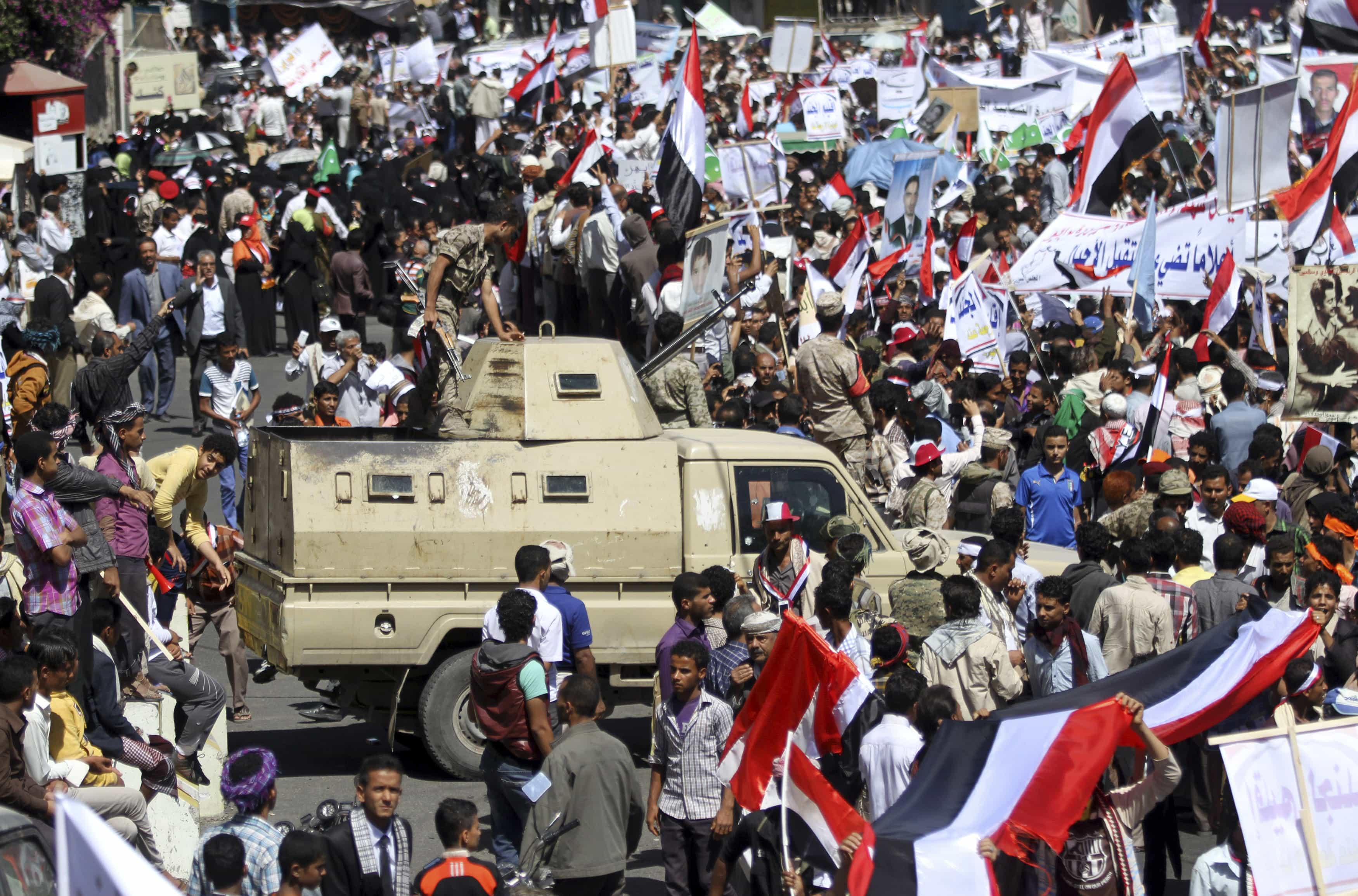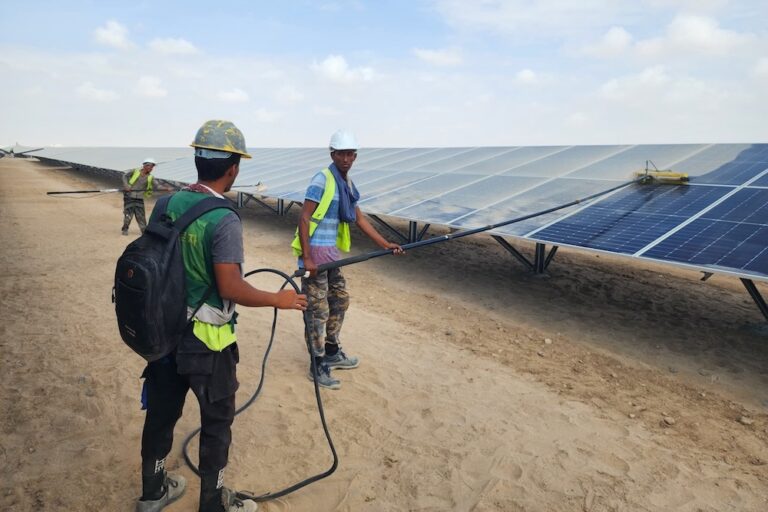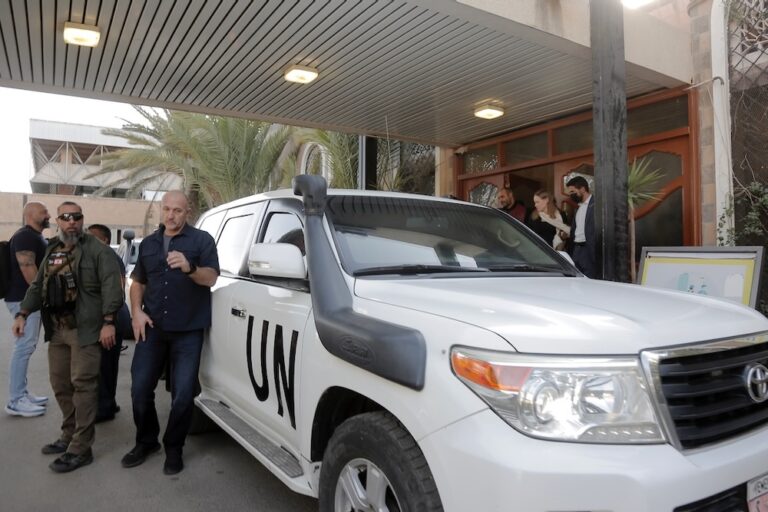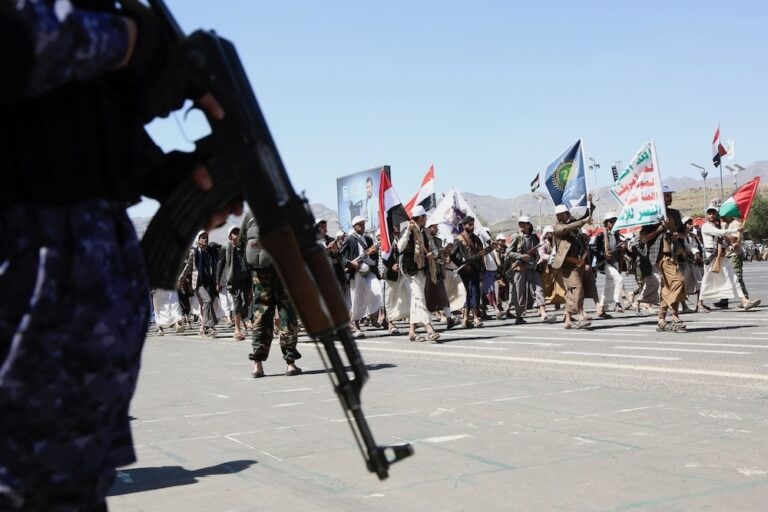Since November 2014, Ansar Allah, a northern armed group, has taken effective control of Sanaa and other areas which sparked protests on January 25 and the days leading up to February 11, the fourth anniversary of the 2011 uprising.
This statement was originally published on hrw.org on 22 February 2015.
Yemeni security forces and militia have beaten peaceful protesters and mistreated those arrested during demonstrations in the capital, Sanaa, since late January 2015, Human Rights Watch said today. The government should hold those responsible for serious abuses accountable, and rescind an indefinite ban on unauthorized protests issued on February 8.
Between January 25 and February 11, Yemeni security forces and men who appeared to be members of the Houthi armed group, also known as Ansar Allah, repeatedly beat peaceful protesters with sticks and rifle butts, witnesses said. They arbitrarily detained at least 46 protesters, though most were released the same day, according to local rights groups. Militias detained another 10 people near demonstration sites for up to 13 days. On February 11, Ansar Allah militia detained three men attempting to join a protest and tortured them, two of the victims told Human Rights Watch. The other victim later died.
“Yemeni authorities need to send a clear message to their security forces, including Ansar Allah members, that beating and otherwise mistreating peaceful protesters won’t be tolerated,” said Joe Stork, deputy Middle East and North Africa director at Human Rights Watch. “People have a right to demonstrate, and the blanket ban on protests should be lifted immediately.”
The authorities should act responsibly and hold anyone who abuses protesters to account, Human Rights Watch said.
Since November 2014, Ansar Allah, a northern armed group, has taken effective control of Sanaa and other areas, leading to the resignation of President Abd Rabbu Mansour Hadi and his government on January 22, 2015. This sparked protests on January 25 and the days leading up to February 11, the fourth anniversary of the 2011 uprising. A February 8 Interior Ministry order instructs Sanaa police to prevent unauthorized demonstrations “considering the exceptional circumstances that the country is facing.”
Human Rights Watch interviewed 31 protesters and other witnesses, including 10 who had been detained, and monitored demonstrations on January 25, 26, 29, and 31. Between 30 and 80 people took part in those protests on each day. Law enforcement consisted of armed men in police and military uniforms as well as armed men in civilian dress bearing Ansar Allah stickers on their rifles and carrying posters with the Ansar Allah slogan: “God is Great/Death to America/Death to Israel/Curse the Jews/Victory to Islam.”
A 30-year-old protester, Abd al-Daem al-Bukhari, said that on January 28, “One gunman started shouting that we were agents of America and Israel. My legs are covered in bruises because one man hit me with a stick.”
Protesters told Human Rights Watch that the armed men beat and otherwise mistreated them, including in detention. Those who had been detained said that their captors threatened to “disappear” them. They said that both the uniformed officers and the Ansar Allah members cursed the protesters and accused them of supporting the extremist group Islamic State (also known as ISIS), the United States, and Israel. Human Rights Watch saw no indication that any of the protesters were armed or in any way threatened law enforcement officers.
One witness said that during the February 11 protest, men he identified as belonging to the Ansar Allah militia stabbed two protesters in the neck with jambiyas, the traditional dagger Yemeni men carry. Two protesters told Human Rights Watch that armed men in civilian dress beat them unconscious with sticks and rifle butts as they tried to approach the demonstration, and detained five protesters.
Local journalists were constrained from reporting on the demonstrations, Human Rights Watch said. The Freedom Foundation, a Yemeni organization that monitors press freedom, reported 25 attacks on journalists during the first two protests in late January. The incidents, most at or near the protests, included abductions, detentions, beatings, and confiscation of equipment.
The government’s indefinite ban on unauthorized public protests violates the right to peaceful assembly, Human Rights Watch said. Article 21 of the International Covenant on Civil and Political Rights, which Yemen ratified in 1987, permits restrictions on peaceful assembly to protect national security and public order only if they are narrowly defined and proportionate to the harm threatened, and to the extent they are strictly necessary.
Yemeni authorities should also abide by the United Nations Basic Principles on the Use of Force and Firearms by Law Enforcement Officials, which provide that all security forces shall whenever possible apply nonviolent means before resorting to force. They should not use firearms against people except to prevent imminent death or serious injury.
“Given the big political changes in Yemen in recent weeks, people will want to voice their views,” Stork said. “The authorities need to ensure that people who want to speak out peacefully are protected, not beaten and abused.”
For accounts of violence against protesters, please click here.



